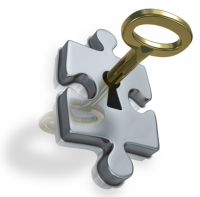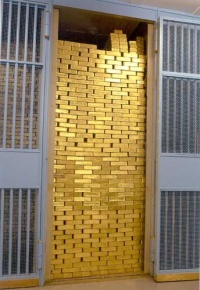 Hopefully you took seriously TIP#1 … skipping the first step will not set the grounding for the information that now follows.
Hopefully you took seriously TIP#1 … skipping the first step will not set the grounding for the information that now follows.Throughout the items you read, there were some components that had the Golden Key Unlocking the Puzzle Piece (picture left). These are key building blocks. Understanding those keys creates the paradigm shift required.
While we may see how simple it could be to undo the hold money changes have over us and our country, and the desire for our Government to open its eyes to the manipulation of the money changers, the reality is that it will be next to impossible. Most who are in Parliament are there because big business got them there… and can take them out. The financial back room brokers and control of the media will ensure this.
And to be honest, what politician has time to really take this on when they are so busy tied up with the symptoms and not the root cause. They are like people so busy tending the gaping bloodied wounds appearing on a man being stabbed with a large knife instead of being a person stepping in to intervene and stop the man still stabbing him.
Cynical? Well, maybe. But to unravel the financial system would take a movement prepared to to it. It is greater than one man in power. It would need all politicians to be on board and to push it through swiftly and decisively. Any half-hearted attempts are doomed to failure. And the money changers will bring a lot of pressure to bear that will initially cripple any person, group or country prepared to take them on. History bears witness to the lengths they will go to. If you have any serious ideas on how to bring about the necessary change at a government level, let me know.
So what can you do?
I will begin a series on Wealth Wisdom. Here is the first couple:
Wisdom #1:
The rich rule over the poor, and the borrower is slave to the lender.
Proverbs 22:7
The key weapon used by the money changers is to enslave you in debt. You can disarm them and be free if you have no debt.
Get rid of debt!
Better still, don’t go into debt in the first place.
Again, the reality is that we live in a society that pressures you from every side to conform or at least live by its rules… that costs money, you don’t have, and debt shackles you to “living the dream”.
I must admit that the marketing ploys and messages that pound us daily, say just one thing: Buy me! Buy me! Buy me! But if you want to “Live the Dream”, here are Two Keys to get your every dream.
If you are in debt, it is time to seriously get yourself free of it. This will take a thing, not widely popular, called discipline. It will require you to deny yourself some short term pleasures for long term gain…freedom.
Here is the plan:
- Apply the 3 Steps to Debt Elimination
- Simultaneously, you need to Budget. There are plenty of ways to learn how to do this: Google, “How to make a Budget”, is a place to start. Budgeting is not a one off, once a year, activity. It requires constant review. Payday is a good day to do the review.
- Resist the desire to purchase “more things”. Necessities only. How do you determine that? Ask yourself, “Can I do without this for 1 more week?” If the answer is “yes”, then wait 1 more week and ask the question again. This will help you breakthrough the ‘desire’ and marketing pull of great advertising. I know this works. I’m a gadget man. Love gadgets. I’m a sucker for newest technology. It takes me sometimes several weeks to break the desire and override the tantalising cry of, “Buy me!”
Wisdom #2:
 Convert Currency to Wealth.
Convert Currency to Wealth.You may say to yourself, “My power and the strength of my hands have produced this wealth for me.” But remember the LORD your God, for it is he who gives you the ability to produce wealth…”
Deuteronomy 18:17,18
Wealth will always hold value and can be the best currency, especially in times of turmoil. Do not get it confused with cash. Cash is just Fiat Money!
Currency is the means of purchasing through trade.
In a specialized society, most of the things you need, you can’t make for yourself. If you want a potato or a pencil or a place to live, you have to get it from someone else.
How do you get the person who grows the potatoes to give you some? By giving him something he wants in return. But you can’t get very far by trading things directly with the people who need them. If you make violins, and none of the local farmers wants one, how will you eat?
The solution societies find, as they get more specialized, is to make the trade into a two-step process. Instead of trading violins directly for potatoes, you trade violins for, say, silver, which you can then trade again for anything else you need. The intermediate stuff– the medium of exchange– can be anything that’s rare and portable… Currency.
Today, currency generally refers to printed or minted money. Sometimes only paper notes (cash) are thought of as currency, while other times coins are included. Currency involves the exchange of goods or services for cash.
Exchange rates refer to a country’s price for the trade of items. Floating currency means that a country’s exchange rate is not fixed or set in place by a main bank, but fluctuates. Fixed currency, on the other hand, is set and is the opposite of floating currency. Fixed currency is also called pegged currency and it is not commonly used, although it is often associated with the Euro and the US Dollar (USD).
The term legal tender means currency that is legally permitted to be used to obtain goods or services in a particular country. Legal tender is usually the country’s own unit of currency such as the AUD in Australia (USD for the United States), but sometimes a country may use the currency of another country as legal tender. For example, the United States once used silver coins from Spain and Mexico as legal tender. These pre-Revolutionary War silver dollars were also known as pieces of eight.
Before cash was used as currency, other items considered valuable were used in trade exchanges. For instance, Aztecs in the fourteenth century used cocoa beans as currency to trade for tools and clothing. Gold dust was traded for European goods in some African countries in the seventeenth century. Salt was used in many ancient civilizations, and is actually the basis for the English word salary.
So while we use Currency to purchase through trade, we must transfer that currency into true wealth. Then when ‘cash’, ‘shares’, or an economy collapses (e.g. Greece, 2010), wealth will remain consistent and hold its value.
So what is wealth?
Wealth is the abundance of valuable resources or material possessions or the control of such assets. The word wealth is derived from the old English ‘wela’, which is from an Indo-European word stem. An individual, community, region or country that possesses an abundance of such possessions or resources is known as wealthy.
The American Heritage Dictionary of the English Language, 4th ed., Houghton Mifflin Company. Accessed 21 Feb. 2009.
‘Wealth’ refers to some accumulation of resources, whether abundant or not. ‘Richness’ refers to an abundance of such resources. A wealthy (or rich) individual, community, or nation thus has more resources than a poor one. Richness can also refer to at least basic needs being met with abundance widely shared. The opposite of wealth is destitution. The opposite of richness is poverty.
True Wealth means you have an abundance of valuable resources or material possessions or the control of such assets. This means no one has any hold over it; no debt associated with it. You own it. You have control over it.
For example, you may have a mortgage for you home and land. Do you own it? No. This does not constitute wealth until it is free of the mortgage. Don’t believe me? Remember to have a look at your Mortgage Contract. The lender can place a call on your loan at anytime. The collateral of the loan is your house and land. If the lender wants, albeit a desperate act, they can ‘fire-sale’ it all for just the amount you owe them. Therefore, there is no inherit wealth in this asset as you hold no control over it until the debt is cleared.
From what I observe, valuable material possessions or resources are items like silver, gold or limited/rare physical items with perceived value – it will have come out of the ground or is the land itself. It is a limited resource…there is just so much of it that exists. It can’t be just created when more is needed (like printing more cash!) and therefore supply and demand will keep it valuable. When confidence fails in all else (cash, shares, etc) these resources can always be traded. Just look at any stock market shake-ups and you will always see the gold price soars as investors run to it.
So whatever ‘currency’ you use to trade with, make sure you convert some of it into valuable material possessions or resources (wealth) and keep stored away safely for a ‘rainy day’.
Wisdom #X:
My son, if you accept my words and store up my commands within you, turning your ear to wisdom and applying your heart to understanding— indeed, if you call out for insight and cry aloud for understanding, and if you look for it as for silver and search for it as for hidden treasure, then you will understand the fear of the LORD and find the knowledge of God. For the LORD gives wisdom; from his mouth come knowledge and understanding. He holds success in store for the upright, he is a shield to those whose walk is blameless, for he guards the course of the just and protects the way of his faithful ones. Then you will understand what is right and just and fair—every good path.
Proverbs 2:1-9
 I don’t have all the answers. Neither does anyone else… but we can collectively share.
I don’t have all the answers. Neither does anyone else… but we can collectively share.
If you would like to share some of your pieces of the puzzle, or even improve mine, please let me know.
I am happy to add more about Wealth and Wisdom to this post.
Click HERE to see what wisdom has since been added or is available.
Click HERE to see more about Wealth.
